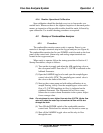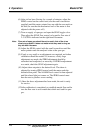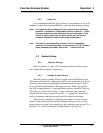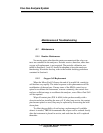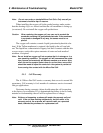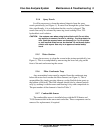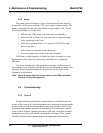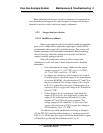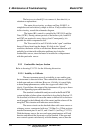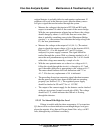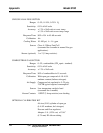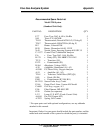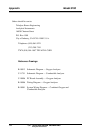
5-5
Flue Gas Analysis System Maintenance & Troubleshooting 5
TELEDYNE BROWN ENGINEERING
Analytical Instruments
When subjecting the analyzer circuits to checkout, it is appropriate to
first check the power supplies for correct output. If voltages are incorrect,
then take corrective action with power supply components .
5.2.2 Oxygen Analyzer Section
5.2.2.1 Inability to Calibrate
If the oxygen analyzer cell circuit exhibits insufficient amplifier
gain, or if it is impossible to adjust the output signal with the SPAN
potentiometer, the oxygen cell is probably used up. This process will
require some time; it will not happen immediately. Before replacing
the cell, however, check the sample circuit to make sure that the
sample is actually getting to the cell.
If the cell is functional, or there is still no output with
installation of a new cell, then a check of the electronics should he
undertaken.
• First, check the power supply. Make sure that proper
voltages exist at A1-7, (+15 VDC), A1-4 (-15 VDC),
A2-7 (+15 VDC), and A2-4 (-15 VDC).
• If voltages are satisfactory, check output of A1 at pin 6.
(It will be easier to check the output of A1 at the tiepoint
of resistors R1/R2/R3.) Use the tiepoint of C7 and C8 as
the power common. The voltage (output of A1) should
be 0.125 V with a full scale signal. If the oxygen cell is
exposed to 20.9% oxygen, the voltage at A1-6 should be
about 0.1 VDC.
• If the voltage at A1-6 is satisfactory, then check the
output of A2 (at A2-6). (It will be easier to check the
output of A2 at the tiepoint of R9 and C6.) Use the
tiepoint of C7 and C8 as the power common. The
voltage (output of A2) should be 2 V full scale. If the
oxygen cell is exposed to 20.9% oxygen, the voltage at
A2-6 should be 1.5 to 1.75 VDC .
In addition to possible malfunctions occurring in Al and/or
A2, the FET (Q1) could be malfunctioning, i.e., not being turned off.
If Q1 is “on” all the time, the oxygen cell will be shorted and no signal
will be able to get through the feedback resistors for A1.



